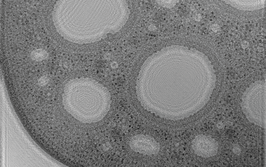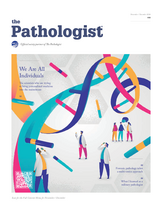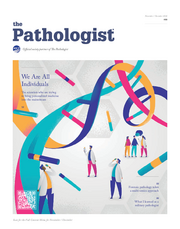How Will the Updated HER2 Guidance Affect You?
Revised guidelines call for increased accuracy and greater pathologist-oncologist collaboration, but will impact workload
The UK has recently issued revised guidance for assessing HER2 in breast cancer (1). While the aim is to improve the accuracy of the test, it could also impact pathologists’ workloads.
The UK guidelines were last updated in 2004, with the American Society of Clinical Oncology and the College of American Pathologists publishing joint recommendations in 2007. “Since the last update, we have seen compelling evidence from Phase III randomized trials that HER2-targeted therapies are both efficient and safe in HER2 positive patients,” explains lead report author Emad Rakha. The incidence of false positive and false negative results have, also, subsequently reduced. “But in negative patients, these same therapies may cause side effects, while also being ineffective and costly – so it’s crucial that testing is as accurate as possible.”
HER2 has a growing role in breast cancer diagnosis and treatment – overexpression is thought to be present in almost a third of breast cancer patients and is found in around 15 percent of early invasive breast cancers. But are assessment methods for the biomarker keeping up?
According to Rakha, the existing recommendations have some shortcomings (2); “In the previous guidelines, a number of new recommendations based on either weak or unpublished evidence were included – such as changes to the definition of a negative test – without enough supportive evidence.” He also believes that some of those recommendations have considerable financial and administrative implications in the lab: for example, requiring labs to record the time, duration, type, control status and number of observers for every tissue fixation. “It was also recommended that an approved assay kit (from the FDA or equivalent authority) is used for assessment of molecular predictive markers. This may appear reasonable, but approved kits are typically far more expensive,” he adds.
The newest update aims to address these issues, but will still emphasize the role of tissue fixation and processing, and provide details of assay methodology, all of which fall at the pathologists’ benchtop. “Implementing these guidelines require labs to improve control of sample pre-fixation time and fixation type,” says Rakha.
The new recommendations are still likely to increase the workload of laboratories, he warns: “The need to test all breast cancer cases, including recurrent and multiple tumors, and to repeat some tests to reduce borderline and inconclusive results, is expected to increase test volume. However, the guidelines stress the role of both the pathologist and oncologist in interpreting results, demanding better communication and promoting a multidisciplinary approach – and most importantly, the aim of these updates is to improve the overall quality of cancer care.”
Key Updates to HER2 Assessment Guidelines in the UK:
- HER2 status should be assessed in all invasive primary breast cancers, and in recurrent and metastatic tumors. Bilateral carcinomas, widely separated carcinomas and any carcinomas considered to be primary tumors should be assessed separately.
- The two-tier system of immunohistochemistry with reflex in situ hybridization (ISH) is still recommended, when required, but bright-field ISH is now an acceptable alternative to fluorescence ISH. Other techniques including PCR, ELISA, southern blotting, mRNA assay and DNA microarray are not recommended.
- Clear definitions of positive and negative HER2 status depending upon assay platform are provided, and algorithms for testing are updated. Options for repeating tests or choosing an alternative in the event of inconclusive or ambiguous results are given.
- The issues of genomic and testing heterogeneity have been addressed, and detailed quality assurance recommendations have been provided.
- E Rakha et al., “Updated UK recommendations for HER2 assessment in breast cancer”, J Clin Pathol, 68, 93–99 (2015). PMID: 25488926.
- E Rakha et al., “The updated ASCO/CAP guideline recommendations for HER2 testing in the management of invasive breast cancer: a critical review of their implications for routine practice”, Histopathology, 64, 609–615 (2014). PMID: 24382093.
I have an extensive academic background in the life sciences, having studied forensic biology and human medical genetics in my time at Strathclyde and Glasgow Universities. My research, data presentation and bioinformatics skills plus my ‘wet lab’ experience have been a superb grounding for my role as an Associate Editor at Texere Publishing. The job allows me to utilize my hard-learned academic skills and experience in my current position within an exciting and contemporary publishing company.




















